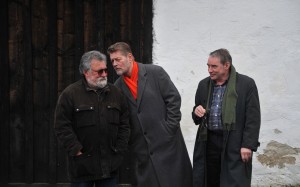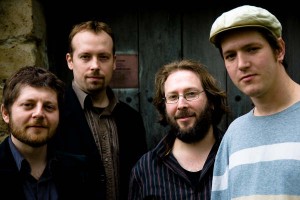Improvisation is everywhere. It’s what we all do, when faced with a fridge full of unmatched ingredients, when there’s a diversion on our normal commuter route when we’re unexpectedly called upon to give an impromptu speech. It’s not a style, or a genre – it’s a process.
Musicians, like comedians and chefs, have always improvised, and the history of music shows a long relationship between improvisation and composition, divided by a snaky line that often blurs. Improvisation can be based on existing compositions, but some of those are based on learnt or written-out improvisations. Written, finely wrought scores, such as those for contemporary music, can be precise and complex, yet may produce results that are similar and complementary to totally improvised music.
The coming together of this double ensemble – the Schlippenbach Trio (with Alexander von Schlippenbach, Evan Parker and Paul Lovens) and Noszferatu (Finn Peters, Damien Harron, Ivo de Greef) looks set to challenge and expand listeners’ ideas about the way improvisation and composition work together. Each ensemble is made of virtuoso performers with impressive pedigrees; each features piano, saxophone and drums.
Noszferatu is nominally a ‘classical’ ensemble, dedicated to playing scores by contemporary composers, yet Finn Peters (sax, flute) is an accomplished jazz performer. He has worked with artists such as Mr Scruff and Matthew Herbert and played a central role in many hybrid projects. The Schlippenbach Trio has acquired legendary status in the world of free jazz, performing each year in what Von Schlippenbach calls his ‘Winterreise’ tour.
However saxophonist Evan Parker has played the music of many composers, including Kenny Wheeler, Gavin Bryars, Anthony Braxton and Barry Guy. As a teenager, drummer Paul Lovens played with Florian Schneider and Ralf Hutter in an early incarnation of Kraftwerk.
The idea for the ‘double trio’ concerts began more than a year ago, growing out of Noszferatu’s previous excursions into extended line-ups with jazz and experimental musicians. The theoretical and literal symmetry of the ensemble with the Schlippenbach Trio was the spark that ignited the collaboration: both groups explore similar musical ideas and sounds, but from different perspectives. There were personal connections, too – between Parker, Peters and jazz composer Hans Koller, who has been commissioned to write one of the new pieces.
The programme also included new commissions from Hanna Kulenty (a Polish composer now resident in the Netherlands), artistic associate Joe Cutler, Finn Peters and regular Noszferatu drummer Dave Price (For this tour, Price’s place is taken by percussionist Damien Harron). Noszferatu’s connections with contemporary Polish music culture – Noszferatu’s Cutler and Price have studied in Warsaw – led to the Kulenty commission.
Peters is thrilled to be playing alongside one of his teenage heroes: ‘Evan pretty much invented modern saxophone playing,’ he tells me over the phone. Though Peters trained as a classical musician, his early exposure to Dutch improvisers such as Han Bennink and Michael Moore broadened his musical horizons.
Improvised music can be very site specific, and the tour’s three venues are quite different from each other. Parker says the physical space affects performance more than the audience realises: ‘After all you are playing with the air in the room.’
Each ensemble will play 20 minutes by itself, and the remainder of the concert will be by the double trio. Peters says: ‘I’m somewhere between classical and improvised music. There’s a point where the notation gets so complex, it could almost be improvised.’
Parker adds: ‘I am more and more conscious of the enormous privilege that my life in music represents and I am looking forward to the Noszferatu project with enthusiasm.’ He notes that the annual tour with the Schlippenbach Trio (with what he calls its ‘ritualised aspects both on and off the stand’) has become a key part of his musical life: ‘I think we are getting better.’
Essay by John L. Walters, 2013
John L Walters is a writer, editor and former composer who has written for The Wire, Port, Disegno, London Jazz and The Guardian (bit.ly/JohnLW2). He founded Unknown Public with Laurence Aston in the 1990s, and edits and co-owns Eye, the international review of graphic design.
Twitter: @JohnLW


